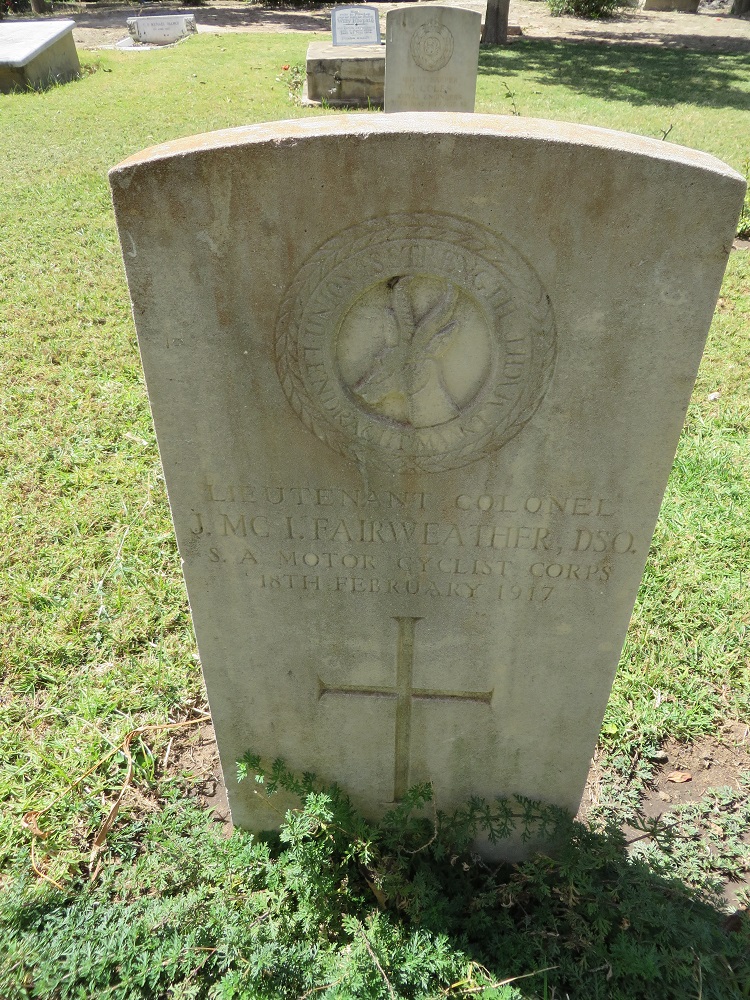Son of Joseph and Jane Fairweather, of Dundee, Scotland. Served in the South African war. His brother Joseph Fairweather South Wales Borders 15 January 1917 also died in service. Remembered on the Lodge Forfar & Kincardine No225, Blackness Ave, Dundee Roll of Honour. He was educated at the Harris Academy, Dundee, and by private tutors, and originally intended for the legal profession, but in 1896 went to South Africa, and joined the Staff of the East London Harbour Board. At the outbreak of the South African War he was Assistant Town Clerk at East London, and volunteered for active service with the Kaffrarian Rifles, receiving a commission in that Corps, later being promoted Captain and Adjutant. He was present in operations in the Orange Free State, February to May 1900, including the defence of Wepener; operations in Orange River Colony (May to 29 November 1900), including action at Witterbergen (1 to 29 July); operations in the Transvaal and Orange River Colony. He was three times wounded; was Mentioned in Despatches in March 1901 and March 1902. Doing especially good service at the Relief of Wepener and at Quaggasfontein, he also commanded the troops which entered the town when Aliwal North was ceded by the rebels. He was created a Companion of the Distinguished Service Order [London Gazette, 31 October 1902]: "James Mclntyre Fairweather, Captain, Cape Colony Forces. In recognition of services during the operations in South Africa". At the conclusion of the war he was offered a commission in the Regular Army, but deciding to return to civil life, he accepted a position on the Headquarters Staff of the Central South African Railways, and at the time of his death held the post of Superintendent attached to the personal Staff of Sir William Hoy, General Manager of the South African Railways. At the time of the Union, he rendered valuable service as one of the special Committee who undertook the task of assimilating the general conditions of service for the administration of the entire staff (involving over 60,000 employees) of the Union Railways. He took a keen interest in military matters in South Africa, and after the Union became Commanding Officer of the Transvaal Motor and Cycle Corps, and later of the Rand Light Infantry. In 1913, during the July disturbances on the Rand, he was in military control of Braamfontein, and again during the strike in January 1914, he rendered valuable services. In July 1914, he was one of two South African officers who left for England on the invitation of the War Office to represent the Union Defence Department at the autumn army manoeuvres. He arrived in England a few days after the declaration of war, and sought permission to proceed to the Western Front, but was instructed to return at once to South Africa. On the suppression of the Rebellion he proceeded to German West Africa with the Rand Light Infantry. A new regiment had to be formed in German West Africa to expedite the reconstruction of the destroyed railway line from Aus westward to Keetmanshoop, thence north to Windhoek, then south through Kalkfontein to meet the new railway line which was being built from Upington, and all railway servants with combatant units were ordered to transfer to this. It was styled the Railway Regiment, and Colonel Fairweather was given the command. He achieved splendid results under very difficult conditions, and was Mentioned in Despatches in August 1918, in this connection. On returning to the Transvaal several months later than the military contingent from German West Africa, he returned for a short time to his civil duties at Railway Headquarters, but later was given the command of the South African Motor Cyclist Corps, and was killed in action on 18 February 1917, at Rupira, in the Livingstone Range, and is buried there. Writing of Colonel Fairweather, Mr H E M Bourne, the Secretary of the Defence Department of South Africa, said: "The death of this officer will be a very great loss, not only to the Railway Administration, but to the Union generally, and especially to the Union Defence Forces, as he was one of the oldest and keenest of Citizen Force officers, and full of soldierly qualities. The example set by Colonel Fairweather was a very high one, and I trust and hope will long be followed by the more junior officers of the Active Citizen Force". Brigadier General Sir Charles Crewe, KCMG, CB, MLA, writing of him, said: "A most gallant officer, and one for whom I have always had the greatest regard...He again in West Africa showed the same gallantry and devotion to duty which was so noticeable in the 1900 campaign. He met his death, and we who all deplore his loss must also feel that he, like many others who have made the greatest sacrifice man can make, died as he would himself have chosen, in action serving the Empire". |
